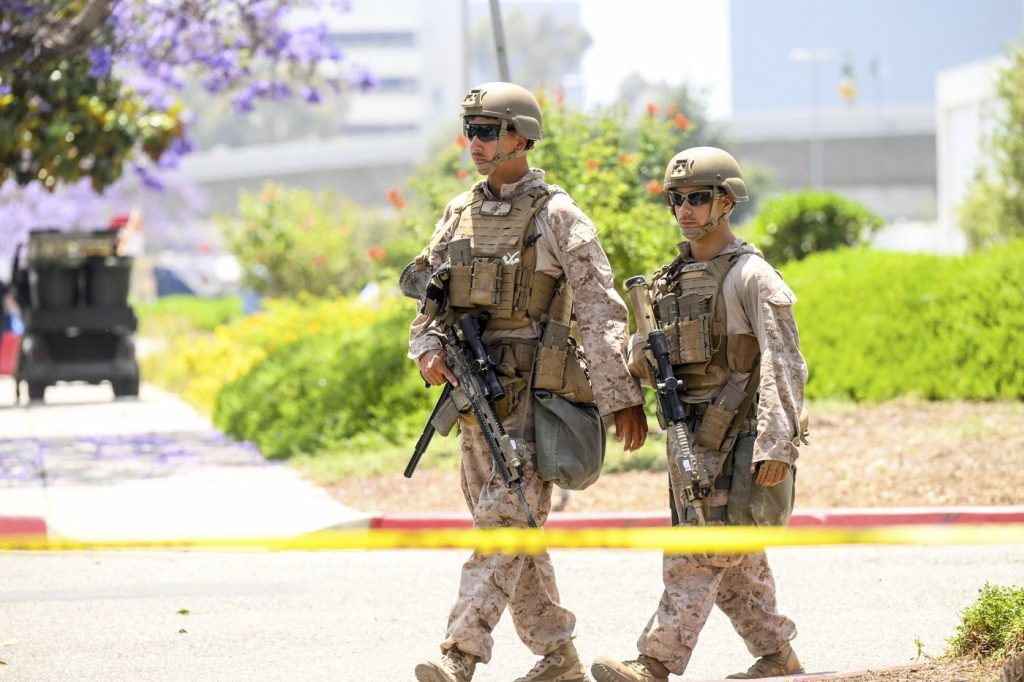On Saturday, major demonstrations were anticipated across the United States against President Donald Trump, coinciding with a military parade in Washington, D.C. to celebrate the Army's 250th anniversary. Cities, both large and small, were preparing for potential unrest, with officials emphasizing the necessity for calm and mobilizing National Guard troops to assist law enforcement.
A central event, the "No Kings" march and rally, is set to be held in Philadelphia, while no formal events are scheduled in the capital. The demonstrations have gained momentum in light of recent protests against federal immigration enforcement raids, particularly in Los Angeles, where Trump ordered the deployment of National Guard troops and Marines to manage civil unrest. Demonstrators in Los Angeles had previously blocked freeways and set vehicles on fire, leading to police employing tear gas and rubber bullets as they enforced curfews.
Officials have publicly criticized Trump's deployment of National Guard troops, with Democratic governors describing it as an "alarming abuse of power," expressing concerns over the administration's distrust of local law enforcement. In contrast, Republican governors in states such as Virginia, Texas, Nebraska, and Missouri have mobilized their National Guard units to help maintain order during the anticipated demonstrations, underlining a "zero tolerance" policy towards violence and law violations.
Virginia Governor Glenn Youngkin stated that violators would face arrest, and Missouri's Governor Mike Kehoe indicated that proactive measures would be taken to prevent chaos. Nebraska's governor also signed an emergency proclamation to activate his state's National Guard as a precautionary step amid rising civil unrest elsewhere in the nation.
The "No Kings" protests are being organized by the 50501 Movement, which advocates for democracy and opposes what they perceive as authoritarian actions by the Trump administration. The name derives from the idea of fifty states, fifty protests, united for a single cause. This series of protests, taking place on Saturday, is intended to challenge authoritarianism and militarization within U.S. democracy and to counteract the otherwise grand military celebration planned by Trump, which is estimated to cost between $25 million and $45 million.
Protesters are expected at nearly 2,000 locations nationwide, encompassing city streets, courthouse steps, and public parks. While organizers anticipate significant turnout, potentially reaching millions, they stress a commitment to nonviolent actions, advising participants to avoid weapons and to de-escalate confrontations. Philadelphia's District Attorney, Larry Krasner, echoed this sentiment, invoking Martin Luther King Jr. as a moral guide for demonstrators, asserting that lawful protests are valid as long as they align with nonviolent principles.
In addition to local law enforcement, various state agencies are gearing up for the weekend. California's state troopers will be on “tactical alert,” cancelling days off for their officers to ensure they are prepared for potential outbreaks of violence. State officials, including Washington Governor Bob Ferguson and Arizona Governor Katie Hobbs, have called for peaceful demonstrations, emphasizing the importance of maintaining public safety and civic rights.
The "No Kings Day of Defiance" has a clear goal of rejecting the notion of kingship within American politics, asserting that the flag and the notion of democracy belong to the people, not to any president. This protest day serves not only to express dissent against the current administration but to unify varied voices across the country in a stand for democratic principles amidst rising tensions. With the event coinciding with Trump's birthday, organizers stress their intention to completely dissociate the celebration from their principles, reinforcing their message that "the flag doesn’t belong to President Trump, it belongs to us."











